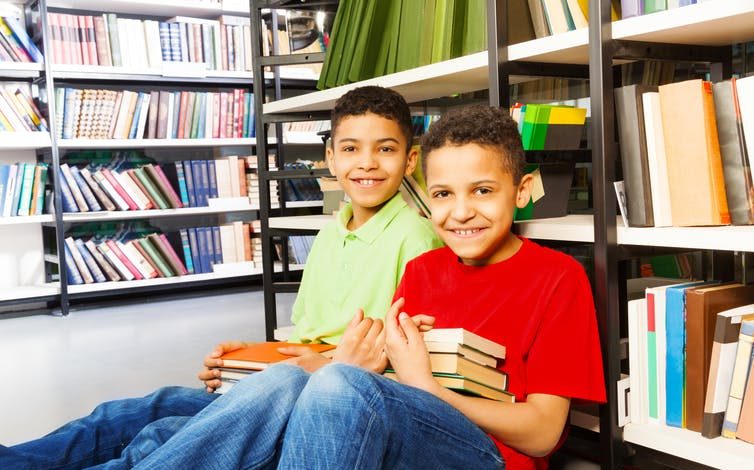
Shutterstock
We know teacher librarians and school libraries play an important role in supporting young people’s reading and broader academic achievement. But school libraries play a more diverse role in students’ lives, among which is to support their well-being.
Here are five ways they do this.
Creating a positive, safe and supportive school environment can help schools meet young people’s academic, emotional and social needs.
Whether students are victims of bullying or simply feel like they don’t fit in, school libraries can provide safe spaces in sometimes challenging school environments. In some schools, the library is the only space intentionally created as a refuge for young people.
Both the library as a whole, and spaces in it, can be adapted to be comforting sanctuaries. A quiet space with comfortable furniture can make the library a place to “get away from it all”.
In recent times the school library has been expected to cater to a growing array of diverse purposes such as sports equipment storage and meeting venues, perhaps challenging its ability to be a safe space. It’s important for schools to ensure, within these demands, students still have a special spot to come to for refuge.
When students are experiencing health and other well-being issues, libraries can have valuable resources to help them understand what they are going through and where to get help. School libraries can also potentially provide valuable health resources to the broader community.
Teacher librarians curate resources (and weed out irrelevant ones) to ensure students get current, quality information. Library staff may also work with teachers and school psychologists to ensure the school community is well resourced for meeting young people’s needs.
The World Health Organisation has emphasised the importance of health literacy and its potential to support better individual and community health outcomes.
Young people need these skills to prevent potentially dangerous misconceptions, such as those that have circulated during the COVID-19 pandemic.
In a 2017 study, researchers worked with school librarians to improve young people’s digital health-literacy skills. The study showed young people had good digital literacy skills when it came to searching for general information. But they had poor knowledge when it came to evaluating the credibility of websites and health information.
School librarians are digital literacy experts. Supporting staff and students with their information skills is part of their job description. School libraries can build students’ digital and information health-literacy skills, helping them evaluate online health information sources.
Reading for pleasure is associated with mental well-being.
School libraries facilitate reading for pleasure by providing comfortable reading spaces, as well as access to interesting texts. Visits to the library encourage young people to read more and positive attitudes toward reading.
Teacher librarians may also make recommendations and read books aloud, which is relaxing for young people.
While much is known about the literacy benefits of reading, keen reading in childhood is also linked to healthy choices and fewer issues with behaviour in the teen years. Reading for pleasure can provide a valuable escape from the challenges of everyday life.
However, the crowded curriculum can lead to reading for pleasure being undervalued in schools. Students at schools with libraries do not always have regular access to them, which is something schools need to ensure is provided.
Teacher librarians may also support students to engage with literature in healing ways. Known as bibliotherapy, which is “healing through books”, students can deal with issues challenging their well-being from a safe distance when they are experienced by book characters. They can also get guidance on how to cope from the experiences and perspectives of book characters.
Teacher librarians may select specific literature to support students encountering particular challenges. This is one of the numerous benefits of the literature expertise of teacher librarians.
School libraries and staffing are under threat and undervalued. These resources are easy to take for granted, and school libraries often lose out in budget cuts.
Where school libraries do not have the staff and materials they need, this can limit their ability to support student well-being. We need to better understand how our school libraries and staff contribute to student well-being so we can make the most of this valuable resource.
The much-delayed English draft curriculum is now out for consultation, generating discussion from teachers.
Research from AUT demonstrates arts, culture and recreation have positive impacts on all aspects of…
How effective has the school phone ban been in achieving its aims? Researchers from the…
School camps and excursions deliver hands on learning experiences, helping to consolidate classroom learning.
Innovations in AV technologies present new opportunities to engage with students. We look at how…
A new report from the University of Auckland’s Our Voices Project asks young people what…
This website uses cookies.